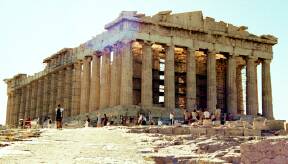
We're having a wonderful time in Greece. One thing I'd wanted to try in this new, "connected," world of the Internet was writing from Internet cafés during our trip. I've planned this time to prepare a modern version of my travel journal, which I will translate into overly long e-mails.
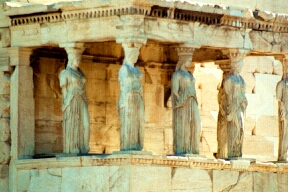
Our travel was unduly eventful, but our attitude about it was ameliorative. Our flight was caught on the starting end of a runway at Dulles for approximately two hours, with the captain shutting down the engines completely at least twice to save thousands of pounds of fuel while we awaited the passing of a terrible storm Friday night. Although we had left a full 2:05 hours for our connection in Amsterdam, by the time of departure, ours, as well as many other travelers’, connections were in serious jeopardy. We landed at Gate E-13, with Sheryl, ever the optimist, predicting that our connection would be to the neighboring KLM jumbo. In fact, we had under thirty minutes to run at break-neck speed all the way to Gate C-15, traversing electronic walkways and many weary international travelers and trying our best to maintain our composure as we politely but urgently asserted repeatedly: "Pardon, close connection!"
We arrived, quite frazzled as both our camera equipment, my computers, and our other carry-ons dangled from every limb all the way through Dutch customs and airport security, to insert ourselves at the very end of the queue during the final boarding of our connecting flight to Athens. Concerned that, at a full run, we had arrived a mere five minutes before scheduled departure, I alerted the ticket agent that our flight had just arrived and pleaded to her trained sympathetic, but utterly deaf, ear, to rescue our baggage.
In a stroke of misperceived luck, airport operations were almost equally hampered in Amsterdam, and we sat at the gate after boarding for another forty-five minutes. The storm front apparently transcended the Atlantic, and most of Western Europe was socked in. I became happier, in spite of the misfortunes of the others, that our bags would have time to rendezvous with our flight.
I overestimated the competence of our hosts as I underestimated the effect of the immunity provided to international carriers under the Warsaw Convention. So long as there is no liability, it was unnecessary to attend to our baggage, and, after waiting a tired half-hour for our large, black, distinctive, international suitcase to roll up the carousel, we surrendered to yet another Dutch clerk, who lied to us brilliantly.
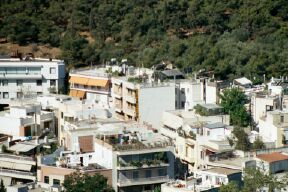
Nevertheless, we declined to allow this to harm our mood. We saved a few drachmas, since we paid no surcharge to the taxi driver for our luggage, and we checked into our room at the Acropolis View Hotel , which we had pre-booked through the Internet. We were shocked to find that the view from the shadows of the Acropolis were understated. While the optimal view from our balcony required leaning out a bit to look around the hotel sign, this was nevertheless impressive, and the scene from the roof was entirely unobstructed and breathtaking. The bags arrived by Sunday noon when we could change to fresh, Mediterranean-appropriate clothing and sun protection gear for our continued touring.
We spent the first couple of days visiting the ancients of Athens. We toured through the boundaries of time from the Athenians overseeing their Aegean domain high atop the Acropolis to the many who sacked them since -- from the Persians, Xerxes and thereafter, influencing the second Acropolis of Pericles; to the Romans at the Ancient Agora; to the influence of the Byzantines and the Turks, and, finally, to their worst nemesis, Lord Elgin and his British imperial command. All have been and remain every here and there in the nooks and crannies of these narrow, unnavigable streets. From the blackened edges of sculptured figures set deep into the stone frescos and cornices in antiquity to be torn from the first Parthenon and burned by the Persian invader, to the many missing stones as small as a fresco panel and as large as a caryatid relieved of duty holding the porch of the Erecthianon to lazily adorn the British Museum and be replaced by signage throughout Athens entirely in English, Athens is a victim of many conquests, only one of which was an assault by the Roman emperor, Hadrian, on his way to destroying the Second Temple.
Now, we've stopped for a break to transmit e-mail reports. I am aware that this is discourteously long for an e-mail, but I'm much enjoying composing it, so feel free to save it for later or ignore it -- as ever pleases you.
Contrary to my expectations, we're really enjoying the food. I had a lamb stew and Sheryl had veal medallions at a randomly selected open-air taverna in the Plaka the first night. Washed down with healthy gulps of retsina -- a bitter, harsh liquid not unlike white wine in its color, chill, or general usage, but which no sensible European would call wine and which I can't imagine drinking upon returning home. With the all too fatty lambs and veals and even chickens and stews, and their accompanying olives and bold bread dipped in olive oil, the taste is indescribably delicate and fulfilling. The next lunch time, Sheryl had a stuffed tomato that reminded her of her childhood, and I had a series of lamb sausages, with two pita breads skillfully placed below to avoid missing any of the commodious accommodations of fat, again thinned into my bloodstream with healthy doses of that wondrous retsina! Together, we have not yet found the time for a side trip to the putatively better seafood at the nearby port of Piraeus.
But, retsina is not for sipping while watching the world walk by the streets and tavernas. That task is assigned to ouzo, a fennel/licorice tasting Greek liquor, which is bottled clear, but turns into an overly sweetened storm cloud of flavor when combined with water. Its an acquired taste, and my determination to imitate prior writers who have acquired it is not matched by my wife's commitment to avoid returning to her college experiences with triple sec.
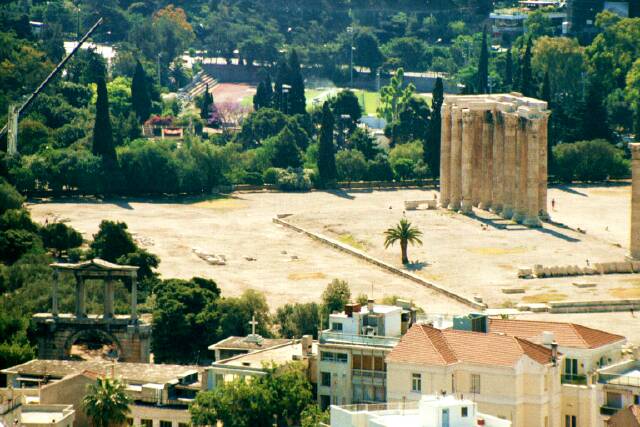
It is impossible to capture the Acropolis in any way not written before. I will not try. This city-state has been sacked so often that it gives a sense of historical context to even the much mourned sacking of the Second Temple in Jerusalem. Hadrian's influence is felt here, as well, with an arch connecting a narrow westbound roadway from the Acropolis to the never completed and since sacked Temple of the Olympian Zeus . The char left by the Persians still shows on the edges of the frescos, and the worst sacking was probably the last, when the British stole a healthy percentage of antiquity to display in London in the 19th century. In this context of repeated horror, it is almost comprehensible that there is little communal recognition of the perfidies of the Greek Holocaust.
We completed our tour of Athens the next day when we arrived for the delayed, Monday opening time of the National Archeological Museum at 12:30 p.m. and were pleased to find that admission was free that day. We later learned that this was in celebration of the Universal Day of the Environment, or some such description whose universality is not as ubiquitous as Greek culture purports to be in modernity.
On the way to the Museum, we discovered a bookstore near the modern business area named Omonia Square and pronounced like the acrid smelling cleanser. On the sixth floor was yet another Internet Café, and we sent our first missives to the children. I was perversely aware the I was a participant in a more modern sacking of Athens, as our only access to the Internet was through incompetent Microsoft server software running on Intel machines.
The Museum contained many wonders, and photography was allowed. Since a picture is better than a thousand words, and I must have taken a thousand pictures, I will not bore you with a narrative. I enjoyed the Museum with less passion than my first adult experience with the Smithsonian, but with a commitment sufficient to injure my feet.
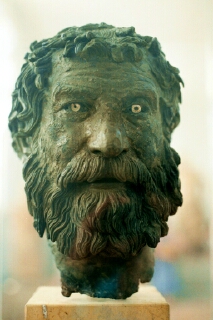
My most shocking observation was that my prior education about Classical sculpture was incorrect. First, it is apparent on looking carefully at the stone that Classical carvings, at least in limestone, were frequently painted; though the attempts to imitate classicism from the Renaissance all ignore this glaring detail. Equally surprising, it is provable that Classical bronze busts did not stare coldly out from empty eyes, like their neutered imitators from the post-Catholic Renaissance into modernity. The Greeks saw the portal to the soul experienced through the eyes, and placed expressive, lifelike jeweled irises and pupils into the bronze representation of the corneas. One particular representation of a philosopher from the Periclean period returned my stare with a wizened visage of long past experience. Even the putative brilliance of a dot in the iris designed to make the eyes follow the observer is vastly inferior to this jeweled representation. The dot so wrongly attributed by my teachers to Gilbert Stuart and his peers was not the renaissance of classical technique, but a serendipitous misunderstanding of the socket used to hold the jewel!
We completed our formal touring of Athens with a light lunch of lamb, chicken, or veal giros, which the Greeks do not seem to translate to English as "gyro," before taking delivery of a rental car and driving on to Delphi by the evening light. As a side note in my continual fascination with my over-nourishment, the ice cream here is divinely inspired, with a rich, creamy texture interspersed with the contrasting roughness of nuts or chocolate chips, and a smooth, soothing sweetness unlike any prior experience I recall -- though Sheryl promises me she will find me a proper Italian gellato from Bay Ridge, Brooklyn upon our return.
The drive was, to understate, exciting. We were unexpectedly required to navigate through the center of modern Athens at what would have been rush hour back home. It was penultimately annoying that the few lane markings that were visible were ignored as if an assault on basic liberty; or that the speed limits seemed posted for the sole purpose of confusing strangers; or that motor bikes from the size of mini-scooters to hogs uniformly roared unmuffled insanely around my less powerful Renault. The ultimate impression of our adventure was that the culture perhaps wrongly attributed with the invention of literature seems incapable of writing a readable highway marker sign. We struggled by after the intervention of multiple Greek participants in a small town between Thebes and Delphi, made our correct turn, and arrived a couple of hours late to a late supper -- even by Greek standards -- under a wonderful tree in the village.
Even my inability to put our French, walled scooter into reverse was only a minor impediment. After Sheryl and I pushed it backwards to complete a K-turn, fixing one of our many miscues on the road from Thebes, and after I provided significant amusement for the young inebriates at a local taverna and one police officer who suggested I cease blocking the narrow roadway because I was incapable of completing my claim to a small parallel parking spot perfectly placed opposite our pension, I angrily disembarked Sheryl to claim our room, and took the damned Froggie around the corner to discuss our American abilities to place a round stick shift up a square gear box. We returned around ten minutes later, shocked to find my parking space still available and promptly filled. In recognition of human limitations, however, Sheryl and I reached agreement that the car could stay in that space as long as we remained in Delphi.
I fell into a deep, and pleasingly inebriated sleep and woke fully rested a mere four hours later, so I've been occupying the early hours before dawn with this pretentious draft. I fear I have bored you, but you have the advantage of my permission to click on "next e-mail," or "delete." We are thinking of you, and, I suppose I write today to ensure you are thinking of us.
I'll write more from our next Internet café, and you are more than welcome to reply, as I will be picking up our e-mails whenever technology allows.
The visit to Delphi was well worth it. We learned upon our departure thirty-six hours later that knowledgeable Greeks always travel west through Greece on the national highway which leads through the Peloponnese and then north from Parthos, and refer to travel on routes over the mountains like "Highway" 48 by some cryptic Grecian curse which my later host declined to translate in the presence of my wife. Nevertheless, we stayed in a nice family pension named the Hotel Varonne, which had a mere nine rooms, all of which had balconies allowing one to look down from the mountain on which the sacred Oracle was read so long ago to a small, modern village on the waters of a tributary of the Aegean. As we arrived late at night and dragged our luggage up the circular steps to our room, Sheryl swung the balcony door open and asked me whether we had a view. The morning light left us both aghast and in wonderment. I took no picture, because my experience in photography convinces me that nothing in my copiously loaded camera case could capture the beauty of the rough Aegean mountainsides sloping to the washes and ultimately the village and the sea below.
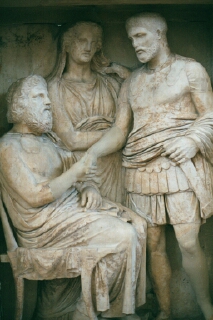
My feet hurt even before we began the trek up the mountain to seek the Oracle. We stopped first at the museum, both because it was on a lower plateau, and because we had arrived at opening time, and we knew that the massing crowds of Greek school children loudly learning their heritage and tour busses of camera-clad septuagenarians would be close behind. As we entered, we were able to take clear pictures and to admire and learn from beyond the millennia.

The Charioteer provided another, more palpable example that the artists of the classical bronzes both understood the significance of eyes in the human spirit and that their renderings of humanity were lost on the Renaissance and remain misunderstood today. The Charioteer peers down around his team with concerned, attentive, and peering eyes painted into their sockets, without Stuart dots, and capped by distinct and sexually expressive eyelashes. While his eyes do not track you as you walk around him, the reason for this is obvious; the Charioteer is looking at his team, rather than the spectators. When one stands anywhere between the original placement of the far right horse and the center left horse in this four-horse team long since lost in history, the stare of the Charioteer captures you immediately with his attentive look to the difficulties of controlling his team, and his youth, inexperience, deference, and sexuality seize the viewer from the shadows of his eyelashes. Not only did this classical sculptor understand perception and visual tracking; not only did he not use dots in the eyes to accomplish this -- he appears to use a technique as yet not known to modern art.
Much was also to be learned about classical Greek idealized concepts of family -- at least from the perspective of those who had recently lost it -- from the funerary stoa, and I paid particular photographic attention to the representations of a family bidding homage to their departed father, though there were equally respectful representations of mothers lost in their youth.
We returned forthwith to our ascent to the Oracle after the mobs of school children became oppressive. Again, the guidebooks are better researched, even if they are translated poorly, and the pictures speak better than my words, so I will confine this description to my highlights and reactions. The Temple of Apollo was as impressive in its construction as it was in its difficult placement in the mountain, and the temple, treasuries, theater, and stadium are worthy of the attention they get in the descriptive guides (though I noticed that the plate showing the stadium in my guide is reversed, for the seats are only on two sides, and, from the two, probably imperial, boxes, the stands lay ahead one stadia (180 meters) and to the right).
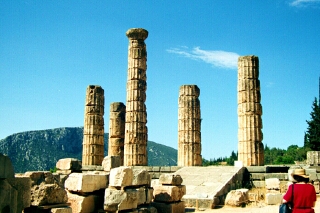
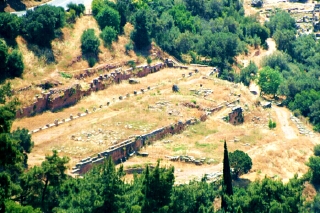
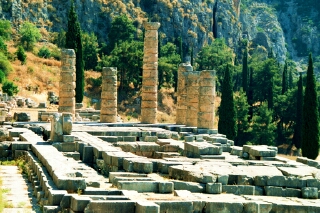
It was curious and worthy of mention -- though very few who ascended the temple found it and only one of the many guides at the temple during my visit mentioned it -- we found a secret passage under the Temple of Ge, the Earth Titan and grandmother of Zeus. I first inspected the small and unimpressive Temple to Ge, which appears to be no more than an evenly carved, eight foot wide, staircase descending approximately 10 to 12 feet to a flat, square floor as deep as the width of the stairs. After an inspection which would have been impossible for the contemporaries of the priests and the Pythia, particularly if normal wooden and cloth accouterments covered the remaining foundation, as it certainly did then, I was convinced that the stairs led nowhere, and I continued my exploration of the downhill side of the temple.
After overhearing a guide with a thick French accent, I slid in through what appeared to be a dead end hole in the front of the temple. It was dark, but my eyes adjusted quickly. To visitors in the Sixth Century BCE, it would be virtually inconceivable that a pathway lay ahead, for the tunnel was covered by a stone edifice of inestimable weight and the entryway was de minimus compared to the edifice such that it appears to be a minor separation in the stone footing more than an entrance. By a device no more creative than a large cloth hung several feet in front of the hole which would be distorted in perspective against the massive edifice of the foundation stones, clergy could disappear into the hole without account. After another turn into the dark, a blind downward step, and a few feet of crawling on my knees uncertain of my path, the tunnel opened to a series of sufficiently lit passageways which eventually ended in three places: a trap door hidden on the outside from both the entrance I had used and the other entrances; a small window which was over-built if its purpose was merely to light the secret tunnel and which would have worked quite well as a draft hole to draw a flame to other parts of the tunnel (except that the stone showed no sign of burning); and a well disguised opening under the last step at the bottom of the Temple to Ge. I debated with other tourists the many possible mystical uses of such a tunnel pathway in antiquity.
From the Temple of Apollo (which contains in its foundation the small Temple to Ge mentioned), we walked down the road to the Castalia Spring. The fountain is said to have been part of the ceremonial purification of the Pythia priestesses before rendering the Oracle and later to have inspired poets and writers who quaffed it, but its face has collapsed under the stress of more than one of the earthquakes which are a part of these mountains back through antiquity. In its present state, the original fountain is inaccessible for visitors, and the spring has been diverted through one of several fountains within a stone's throw of the original. The fountains, however, could be confused with a drainage pipe for water dumped from the museum site higher on the same mountain, so I delayed until I had spoken to a more modern oracle in the form of the guard at the Temple to Athena nearby. Since his only languages were Greek and Italian and mine were English and pigeon French, we had to suffice with symbolic communications. But that could not lead me any further astray than the original Oracle, so I drank from the natural spring on my return later. The water was refreshing, cool, and tasty, with neither too much iron nor too little mineral content to mark it as spring water. I washed my hands, wet my hat brow, filled my cup, and drank again.
The remains of the Temple of Athena Pronaea lies on the other side of the road and below the Temple of Apollo, and it lacks its magnificence in size. Three columns of the Tholos have been restored and reassembled, and a picture that I hope is as powerful as the human perspective lay before me, with the Athenian Tholos in the foreground and the more massive foundations and columns of Apollo's Temple, where the Oracle was read, far above it on the mountain, followed by a backdrop of observers in the ancient theater.
After allowing ample time to wander, and far more than ample time for me to remove my shoes and sox repeatedly to stretch the aching tendons in my feet, we returned to our room in Delphi. I have become accustomed to different names for these places, but it is difficult for me to understand how modern English has found its spelling and pronunciation of Delphi. In Greek, the letter "delta," which we interpret as the sound of a "d," is actually pronounced as a sounded "th," and for reasons that seem only to apply to romance languages lacking a "th" sound, are sometimes spelled in quasi-modernity as "nh." Further, the "i" at the end of Thelfi is pronounced with an English long "e," with an end result of Thelfee, or, in Greek letters, qELGI.
The problem is worse for Mycenae, which we visited closer to the end of our trip. In Greek, the name of the city is Mi-kee'-nas, spelled at least four different ways. I suppose, most Americans would confuse that name with Mykinos, pronounced Mik-in-os', one of the sun-drenched Cyclotic islands. How anyone, however, changed the name of the earliest civilized nation -- the home of Agamemnon -- from Mikeenas to Mycenae was unclear to either me or any of the Greeks, including map publishers, I consulted. Even the road signs are uncooperative.
On return home, however, a friend and colleague, whose high school studies included Greek and Latin, suggested that the Brothers Grimm, of fairy tale fame, had studied how language changes over time, and had concluded in their epistemological studies that short "i" sounds change to long "i" sounds; hard "c" sounds change to soft "c" sounds; and long "e" becomes short "e". When one notes that the Latin suffix for "one who hails from" is "ae," and Anglicizes the name of a citizen of Mikeenas by changing "-ae" to "-aen" and then generalizes, the result is a Mycenaean walking the turrets of antiquity of Mikeenas. Bucknell's Linguistics Department has an interesting lecture on that available on-line at http://134.82.9.27/linguistics/lectures/05lect22.html.
Nevertheless, we made our way from Thelfee, by its better spelling, early the next morning, taking the route through Ikea and Parthos, rather than the locally cursed route over Mt. Parnassus, to Ioannina. Awaiting and refreshed, we finished an early breakfast and headed for the car, only to find that a slow leak had flattened one of the tires half way. Since the car was parked on a steep hill, and a wait for Hertz to arrive in Thelfee would be of an indeterminate length, I attempted to roll the car around the block to have the tire checked and changed at the local gas station a block away. The short trip destroyed the tire. We allowed the attendant to change it for us, tipped him slightly (for he charged us nothing for his service), and, in the bargain, had him explain, finally, the proper way to shift the car into reverse.
As we drove into downtown Ioannina, we happened on the local Hertz office, so we stopped to replace the spare tire, get a local street map, and inquire about the cost of changing our plans to return the car in Ioannina or Corfu and fly back to Athena (the correct name of the city of Athens). The Hertz representative was wholly uncooperative, asserting that our collision damage waiver excluded damages caused by anything, and that we were responsible for purchasing a new tire for Hertz. After Sheryl casually suggested that the matter ought be discussed with the Tourist Police, the tenor of the discussion promptly changed, and the tire was soon repaired, but nothing could convince the representative that he should not take maximal advantage of a change in our contractual plans. He insisted that our car was an Athenian-based car, since it was more suitable as a city car and was solely based in Athens, such that we would have to pay the cost of having a driver return the car to Athens for around 60,000 drachmas (USD $160). We declined, and decided to skip Corfu, enjoying beach time closer to Athena, either in the Cyclotic Islands or on the Peloponnese. Only two days later, when I inadvertently locked the keys in the car after removing our bags for the last time in Athena, would we learn that the extra set of keys were not in Athens, because the car was regularly assigned to one of the islands. Nevertheless, the serendipitous uncooperativeness of the Hertz clerk in Ioannina led us over the ferry to Parthos onto the Peloponnese and to an unexpected visit to Mikeenas.
Our visit in Ioannina rose gradually into a crescendo. Of course, the slope was accentuated by the uncooperativeness of the Hertz representative as we first entered Ioannina, but our objective, the search for Sheryl's pre-War European heritage in Ioannina, was an exploration into the story of American Jewry. We had asked a friendly shopkeeper in Thelfee about our search for 13 Psalitha Street, which prior family research had identified as the former family home, to be told, in credible terms, that Greek streets would never be named Psalitha, which translates to "scissors." Our host in Delphi could not imagine a Greek naming a street after a kitchen appliance with all the names of historical Greek gods, titans, giants, and both mythical and real heroes available for use. Nevertheless, Ioannina is a big city in Greek terms and has been since, at least, the 12th century CE, and the otherwise uncooperative Hertz clerk in Ioannina found the name in a taxi directory and marked it on our map.
The street is so old that it has no street name plaque, and we were now inland in Western Greece, where English is not nearly as common, though we were told that 80% of the modern Greek economy is based on tourism, and throughout the rest of Greece, English was more available than any other language, with the possible exception of Greek. With the use of much symbolic language and pointing at a map, a baker sent us to a nearby taverna, where patrons found a manager and a local patron who spoke much better English than I spoke Greek, and we worked our way to Psalitha, with each person consulted denying that a Greek road could actually be named for a pair of scissors.
We wandered up and down the short, obviously ancient street just outside the walled castle erected by the Byzantines and just near an ancient gate that would have provided a short Shabbat walk to the still-remaining synagogue. We were assured that this entire neighborhood had been Jewish prior to Hitler, and we could feel that we were in the right place as we peered over courtyard walls into broken down, but once luxurious courtyards. We had arrived around 3:30 p.m., when almost all Greeks are napping in preparation for the evening work, walk, and play, and it is considered quite impolite to disturb the siesta, but we had come a very long way and were still planning to leave for Corfu that night.
We happened upon a young mother, her sister, and their mother caring for an 18-month old and handling the laundry at 11 Psalitha. It is fortunate that one of the constants of the human experience is that toddlers never nap when commanded, and we were invited in as one of the sisters used her pigeon English to identify our quest while her mother served us delightful chilled tap water and syrupy sweet, espresso-thick, Greek coffee which I politely attempted to sip in between quaffs of the much needed water.
We failed to communicate our quest, with our hostess believing that we were seeking my wife's long deceased great-grandmother at the address from which her 14 year old daughter had departed many years before. When the Albanian tenant family renting one section of the old house, whom our hostess apparently believed were the owners of the premises, were unable to communicate about the whereabouts of the current owner, we toured our hostess's much smaller home -- finding it quite commodious -- and took pictures of the family home of the Hametz's of Ioannina. We then imposed on our hostess and our trust in her ability to understand our English, to find one of the few Jewish members of our generation still in Ioannina, Allegra Matza, the daughter of Anna Matza.
Allegra is listed in the Frommer guide to Greece as the keeper of the keys to the ancient synagogue of Ioannina. In fact, she is the only English-speaking person with access to the keys. The synagogue is still maintained by donations, but is in disuse. With only 40 surviving members of the Jewish community, including women and children, it is only possible to get a minyan when Israeli children visiting their elders come once a year for Yom Kippur. The light of the Shabbat Queen and the Havdalah no longer shines in Ioannina, and I cannot express my tears for that to my Gentile friends.
Allegra was woken from her siesta by our hostess at 11 Psalitha, who walked us to the Jewish apartment building in Ioannina's once flourishing Jewish neighborhood of thousands. We pushed on the button for the name Anna Matza, because none of the other names were at all familiar, and the name Matza appears in Frommer, is a recognizable Jewish word, and we believe that the Matza family is intermarried with the Hametz family. (At very least, the words are related, since Matza is the proper bread eaten at Passover, and Chumetz is the bread eaten the rest of the year and unacceptable at Passover.
After a brief wait, Allegra herself appeared on the balcony in a nightgown, glaring impatiently at our Greek hostess. After identifying us, however, Allegra quickly descended the stairs to greet us and apologized that she could not invite us into her home because her mother had been sick and she had moved in to care for her. She patiently answered our questions, but explained that the shops would not reopen that day and that she did not have access to the key to the synagogue. She told us about the decline in the Jewish population of Ioannina, explained the Jewish perspective on the debate on Greek identity cards, and gave us directions to the synagogue.
We walked the narrow streets as her great grandfather must have at the beginning of the 20th century and made our way the couple of blocks to the padlocked gate of the synagogue. We tried to make out the Hebrew letters and to peer around the outer wall to little avail. It was now after 5:00 p.m., and we made our way back to 13 Psalitha, with Sheryl considering staying the night in Ioannina in order to see the synagogue the next day.
When we returned to her maternal ancestral home, its current owner had returned. With the friendly Algerian tenant looking on and smiling from behind bad teeth, I sought to communicate in a combination of pigeon French and symbolic language, having been convincingly informed by the nice, young mother next door that the owner spoke no English. After a grueling 15 seconds, our new host's eye twinkled, and he responded in perfect tone: "Well, I guess we ought to do this in English!"
Stassos, short for the ubiquitous Anistossos, is the son of the current owner, who grew up a couple houses down the street and bought this house from an Israeli, who bought it from another Greek. The courtyard is in need of maintenance, but the house is extremely large, and could easily have accommodated the parents and seven siblings of Sara, Sheryl's grandmother and matriarch of the Hametz exodus to Brooklyn just before World War II. There would have been no hint of poverty. While the house is today occupied by only Stassos and his aging mother, the top floor is completely sealed, having last been used by the Israeli owners, the next floor is occupied by the mother in separate apartments, the present tenant space was then the cooking area, and Stassos occupies two floors of multiple rooms and twisting corridors. The home has dozens of play spaces for small children, and lies a few paces from both the ancient synagogue and a beautiful view of lakeside now occupied by some pretty tavernas.
Sheryl's progenitors did not live in poverty, but the current Greek attitude about Judaism masks a subtle racism that they would fervently deny. During our visit, a major debate was underway in Greece. It has been proposed that religion, which they entitle nationality, be removed from their identity cards. Not only is the concept of a national identity card an anathema to the American intellect, but I cannot think of anything more reminiscent of Nazi Europe than having the word "Jewish" written on a mandatory card given to me by the government.
Even Greeks who claim to favor the elimination of nationality from their identity cards see the issue as minor. The shopkeeper who treated us to drinks in Delphi and noted that his first wife, by whom he had two daughters, was Jewish, explained that over 95% of Greece is Eastern Orthodox, and the second largest group are Muslims. He explained the lore, as he understood it, that the Jews in Athens had largely survived the Holocaust, an assertion that is not supported by the facts, because they agreed when the Greek authorities rushed to get them new identity cards saying "Orthodox" before the arrival of the Nazis. The Jews of Ioannina refused for reasons he could not understand. In his mind, the identity cards were turned on their head as a method of redemption, rather than a mild version of a yellow star subscribed "Jude." He nevertheless disagreed with the uprising of Orthodox clerics and older Greeks, who were arguing that removing religion from the identity card would reduce Orthodox religious participation.
The racially tinged Greek confusion of religion with nationality was more apparent when we arrived in Ioannina. The two, wonderfully helpful and friendly Greek sisters living in the formerly Jewish quarter, referred to the neighbor as Albanian. She referred to Jews, which in Greek is a rough equivalent of Hebrews (E-bra'-es), as if they were a nationality or race, as well. As she described, there is no discrimination in Greece, because, after all, here is a Hebrew shop, and there is a Hebrew apartment building, etc. Although Allegra Matza explained that there were no ghettos in pre-War Greece, allowing the Jews of Ioannina to live either inside or outside the walls of the Castle, their home would be roughly defined by the walking distance to the only synagogue.
Even our delightful host, Stassos, whom I cannot be convinced has ever suffered a hostile thought, spoke the same way of race and religion. It was clear after reviewing his words that he was referring to all Jews, regardless of place of birth, as Israelis. This was non-discriminatory in his mind, because, as he explained, it would be only natural to give the Israelis citizenship once they had completed military service. Nevertheless, an Albanian is a person whose family tree derives from Albania (and might be synonymous with a Muslim), and an Israeli is a Jew even if his family immigrated in 1100 CE These concepts are foreign, and largely repugnant, to our American psyche, perhaps because we are a country of immigrants, and we cannot bear to retain the badges of our origins in a manner superior to our American rights.
Nevertheless, the people we met were delightful, and we stayed overnight in Ioannina after Stassos offered to meet us for Greek supper and drinks at 10:00 p.m. We were introduced by Stassos to new, wonderful foods and drink. I was taught that my 50/50 ratio for ouzo to water was ambitious even for a Greek and that a better beginner's mix was 10:1. We tried combining that wondrous retsina with Coca-Cola, which Sheryl and I both liked. I was shocked that the delicacy of jellyfish was one of the best things I'd ever tasted, and the calamari and lamb stew were terrific. Only the fried feta cheese was unable to persuade me; I hate the stuff in America, and frying it (which pleasingly removed its lumps) did not make it tastier to my palate. The food was accompanied by exchanges of jokes, which Stassos performed shockingly well -- especially for a person whom I'd thought to be uneducated in English -- and we learned much about Greek hospitality, manners, and just kindness from this gentleman of Greece. We invited him to stay with us in our home in America, and he promised to find us lodging with friends anywhere in Greece if we returned with the children later. Stassos tried to arrange some form of gift exchange, but I could not understand the custom. I do believe he wants us to get him some sort of Spring jacket, once he learned that perfumes in America are frequently French, and I plan to get him a windbreaker from my alma mater when I'm next there. The evening alone was worth staying the night, even if the air conditioning worked improperly in the hotel recommended by Stassos and the insects were professional and thorough in dispatching us. We sought to connect to the Internet from our room telephone, but the connection to AOL broke so often that the adventure of sending a few e-mails cost 2200 drachmas, plus the surcharge we'll learn about only when our monthly AOL bill arrives, though each half minute is supposed to cost a mere 20 drachmas. I now understand why cell telephones appear to be so ubiquitous in this country; unlike America, they lose their connections less often than the nationalized telephone system.
The next morning allowed us to see the synagogue at Ioannina. We walked first to Allegra's shop, but nobody seemed to be there. We asked of two old men on the corner about Allegra, and, though we spoke no common languages, I think they knew we were the visitors from the day before and, upon failing to find Allegra, they sent an old Jewish man with the key to let us into the garden and sanctuary.
I cannot describe my reaction to the old synagogue well enough to satisfy my own standards. I tried my best to ask the old man if there were any earlier records by which we could track Sheryl's heritage. Based on something Allegra had said the day before, I concluded that the only records remaining were the records of the war losses, and I copied the names of all of the Hametz's murdered in the Holocaust. The family lore that all of the Hametz's escaped Ioannina is false. Approximately 96% of the Greeks who left Ioannina in 1944 in the custody of the Nazis never returned, a story that is mirrored throughout Greece, except in Athens, which, due to post-War Jewish immigration, suffered a loss of only 67%.
I walked under the Succoth, which seems to be improperly allowed to remain all year round. Nevertheless, I could feel the presence of those before me, even more than I could feel the more famous Greeks on the Acropolis. As we walked through the gates of the synagogue, I kissed my hand and reached for the right door jamb in an international signal to my host of my faith, but I could find no mezuzah on either the gate to the garden or the door to the sanctuary. I walked through the rows set out in a Sephardic oval with a raised Reader's Bimah and the raised Ark forming a line bisecting the oval. Our host took no kippah upon entering, and I could not find one at first, so I covered my head with my book as I ascended the Bimah and approached the Ark.
Our host helped me as we pulled the curtain to open the Ark. Inside were four, pre-War, Torahs fully dressed. Unlike their Eastern European counterparts, they were untouched and I was assured they were kosher and pre-War. I extended my hand to kiss the dressing of the two front Torahs, and I could not keep a small tear from welling as I thought of the many, from foolish to wise, that these scrolls had taught.
Those Torah teach nobody any more, for the congregation assembles only once a year, when they can achieve a minyan for High Holidays. They have no rabbi whom I heard mentioned, and the 100 remaining Jews referred to in Frommer's recent book is now down to a mere 40. Allegra winced with a characteristic, Jewish expression of "of course" when I suggested that there are more Jews of Ioannina in Brooklyn than in Ioannina. I resolved with Sheryl that I want to do something to protect those Torah and that synagogue, even if it is only to act as a monument to the vibrant Jewish community that once was. I left Ioannina saddened, but much more educated.
I enjoyed the drive back to Parthos, though Sheryl was less enamored of the journey. It was daylight, and I was getting better at the art of Greek driving, which includes driving in excess of 85 mph in a go-cart with a license plate on the back and tires just slightly too large for a lawnmower, while either driving in the emergency lane blindly around mountain curves, or passing across double white lines in nearly blind turns. Greek drivers trust that the other drivers will keep to the right off the road to allow passing even when there is nobody behind them, knowing that a car may come around the mountain curve on their side of the white lines. This may account for the incredible number of private Orthodox memorial boxes set up along the roads by family members who have lost their loved ones to this vehicular ritual, but, most of the time, it works.
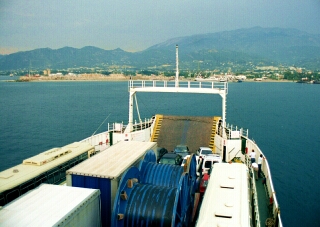
I admit to enjoying the feat of backing my tiny Renault Twingo onto a ferryboat that was a part of the national highway. We came to a docking port that we'd seen when I made an incorrect left on the way from Thelfee to Ioannina, and I understood that the Greeks were queuing for the opportunity to fly their little cars into a K-turn and back onto the ferryboat. I had a strange recollection of my father doing something like this in my young childhood when the Staten Island Ferry still existed, but every ferry I've seen since allows embarking from one end and disembarking from the other. I partially understood why the more knowledgeable drivers were reversing their cars and then waiting in reverse so they could be the last vehicles boarded, but I decided to get while the getting was good. I boarded in reverse as soon as the dockhand pointed to me, quite thankful to Ares (or is it Xanthus and the Winds) that I had learned how to put this matchbox car into reverse.
As we squeezed close to the double oil truck to my left, the longshoreman impatiently waived at me in international symbolic language to move even closer. I did not understand, but did as instructed until I was so close that my window was three inches from the valve for emptying his load, and slightly underneath the vehicle. I then noticed that another double truck was being loaded to my right.
The white covered pick-up truck in front of me appeared to panic, and he pushed his vehicle into gear and moved out of his spot. The longshoreman looked at him and then waived unintelligibly to my right. Sheryl concluded that he was leaving the ferry and exclaimed to me, "Don't leave! We've already paid!" Neither of us could keep from uproarious laughter that neither of us had a clue as to what was happening. A few minutes later, I was parked in tightly on both sides, and the white covered pick-up truck was on the right -- third in line to be disembarked.
The trip across the Sea at that point is a mere 15 minutes, so I barely had time to escape my car with my camera by climbing over the stick shift and squeezing my bulk through the tight fit of the passenger side door. I considered leaving through the rag top sunroof, but managed the squeeze through the door once Sheryl left. I reached the upper deck just in time to conclude that there were no decent pictures. I took a few snap shots that I'll probably never print and returned to the car.
We continued our drive from Parthos on the Peloponnese until a lunch break by the sea. I was surprised that Stassos was correct and the road changed into something even an American would think of as a state highway. We had two and sometimes three lanes in each direction, and, with Greek driving traditions adding the shoulder, often a full four lanes for travel at speeds as high as 150 kph (90 mph). Sheryl cringed as I struggled to keep up with the prevailing traffic flow on my lawnmower tires. We made incredibly good time compared to our earlier travels across Route 48, and were ready for a lunch break early when we realized that we'd arrive in Korinthos (Corinth, of the famed Corinthians) too soon if we didn't break.
We "discovered" a little sea town along the Korinthian Sea, which separates the western part of the Peloponnese from central Greece, named Akra Akrata. There were no foreign tourists here, but it was Greek siesta time, and a half dozen men were sunning and playing in the sea and on the pebble beach, while a few Greek groups and couples lounged lazily in the afternoon, Greek sun at the several tavernas. By now we had learned from Stassos that Frommer is correct that a 13% tip is included in all meals for service and that we'd been mildly victimized by Athenian waiters, but we realized that the tourist vendors at home are no less opportunistic. We had a pleasant lazy meal overlooking the sea sharing a large tomato and cucumber salad followed by a pastichio, which Sheryl enjoyed more than me, and a linguine with shrimps, which I enjoyed more than her. Afterwards, we took a walk along the beach and found a stand to buy a cardboard container of chocolate chocolate chip ice cream, which was tasty, but exactly like its premium American equivalent from Baskin Robbins or Haagen Daz.
We returned to the highway, and were in Korinthos in what seemed to be minutes. We easily made the right hand turn that took us from Route Epsilon 65 to stay on Route Epsilon 65 towards Tripoli, rather than continuing straight onto what would become Epsilon 94 into Athena. As I write this, I am looking at our road map for the route numbers, for such numbers are nowhere to be found on the roadways of Greece. However, as Stassos had taught us, this is a country of a mere 10 million people, five million of which are in Athens, and there aren't that many roads. Once we surrendered from the certainty expected in American interstate driving, we realized that it was relatively difficult to make mistakes.
We were now on a roadway that opened so recently that it appears as a mere right-of-way without connecting roads on our Hertz map, and has even fewer signs than the unsigned Greek roads throughout the rest of the country. Not only did neither of our maps indicate the existence of anyplace that sounded like Mycenae in any of the four spellings to which I'd become accustomed, but, even if you knew the correct spelling, it wouldn't help. We confirmed later from the concierge at Dassos Hotel, our pension that evening, that there are no signs for Mycenae, Mikeenas, Mycenes, or even (as it appears on the Hertz map) "My Kines" on the national highway, perhaps because Greeks assume that nobody would pay 600 drachmas (about $1.72) to travel three exits (approximately 31 miles) on a major highway when the old Athens-Corinth Highway is nearly parallel and free, as it winds across railroad crossings with one lane in each direction. I confirmed that Mycenae does not appear at all on my other, purchased road map, but I knew from Frommer's guide that it had to be north of Sterna, so we left the highway one exit after Mycenae and made our way back, knowing that Stassos was correct, and all Greek roads pointed in the correct direction go where you want to be. As foreign as this sounds to American ears, we were driving in Mycenae within half an hour.
Sheryl had selected a pension for the evening based on Frommer's recommendations. We bickered a bit, because I'd wanted to call them on the telephone in town to get their best price, feeling that we'd been a bit abused in Ioannina at the Galaxy Hotel. Unfortunately, to use the telephones in Greece, you need a telephone card; the telephones take no coins. I could not understand from the townspeople neighboring tourist Mycenae how to buy and use a telephone card. Every Greek dismissively explained that the telephone service is practically free, but my experience reaching AOL in Ioannina had cost almost $6.30 (2,200 drachmas) and accomplished little. I concluded that the card cost 1,000 drachmas, which was too much to continue this experience, particularly with Sheryl growing tired in the car. We drove back to the pension, walked up to the desk, and prepared to be overcharged the full rack rate. The pension Sheryl had selected for the evening was full.
We disqualified the pension at which Schliemann had stayed when he excavated Mycenae after finding Troy in the 19th century. A sense of history is nice, but bathrooms and showers in the hotel rooms are even nicer. We walked down the street until we found what appeared to be a nice place, and we knocked on the door. We could see that the tables in the breakfast room were set and the art remained on the walls in a clean and orderly lobby, but the place was entirely empty. An old woman who spoke no English approached us from around the corner outside the building, conveyed that the hotel was closed, determined that we were Americans, and signaled for us to stay while she summoned a Canadian national who ran a nearby pension. We sat on the porch of the closed pension as I began to feel that I was wearing a giant target labeled "Tourist." The Canadian arrived and pulled up a seat. I asked if her hotel had bathrooms and showers. She said it did. I asked where it was, and she answered "Nearby." I wanted a commitment on price before we went like fish on the hook to her basket, but we agreed to see her rooms before we talked about money.
The room was nice, though it overlooked the street, with all her rooms facing the mountain being taken. It was a walk-up and had no air conditioning, like most Greek pensions, but the concierge agreed to arrange a fan for the room. I had to admit that the shower was nicer than we'd seen in a few days, and the room came with twin beds aligned together and two bunk beds perfect for a traveling family not overly committed to sex, and it was a commodious and clean room and breakfast would be delivered in the morning. Once we'd wasted 45 minutes in this winnowing process, I assumed the concierge would announce an outrageous price, and we'd need to either accept or seek to negotiate with Sheryl getting cranky. She quoted a price of 10,000 drachmas ($28.65), which was two-thirds of the price we'd been hoping to pay at our original choice. We accepted without debate, and proceeded to a much needed and delayed Greek nap.
We woke around 10:30 p.m., and I assumed upon stepping out on the balcony and hearing nothing that this town did not follow Greek customs, and that everyone was in bed. Sheryl woke, as well, and we were both a bit hungry, but decided we'd survive if there were no food to be found. We followed Greek custom and began our evening walk, first walking towards the historic site, and then turning after the end of town up the only other road back down the hill away from the historical site. I heard voices inside homes, saw a few people sipping ouzo on their balconies and watching television inside, but saw no sign of commerce. We were past our pension and about to complete our circuitous walk when we found the five or so tavernas serving the townsfolk in proper Greek fashion. I ordered a tasty enough lamb souvlaki which I ate hungrily with much hearty bread and generous doses of a red wine that called itself retsina and tasted more like a fruity, bitter, European table red than the more bitter white retsina. Sheryl ordered a stuffed eggplant which was so divine that Menelaus Taverna was the only restaurant which we visited twice in Greece, for I insisted on having that eggplant for lunch before leaving Mycenae.
The next morning, we rose early, ate breakfast quickly, and arrived at the site soon after opening, which was mandatory for all of our touring to avoid the massive crowds, which consistently arrived at the entrances by 9:30 a.m. and were pervasive on the sites by 10:30 or 11:00 a.m. It was a constant struggle throughout Greece to stay one section ahead of the massed school children and tourist busses.
I was unexpectedly impressed by Mycenaean accomplishments. The Mycenaeans predated the Classical Greeks by as much as a millennium, with their civilization dating from around 1700 BCE to 1300 BCE and the Periclean height of Athenian culture occurring after the Persian assault around 550 BCE By the time of the Classical Greeks, who brought us what is currently taught as Greek mythology, though some of its roots are Mycenaean, all cultural memory of Mycenae was gone. The Classical Greeks looked at the massive walls surrounding Agamemnon's palace and concluded that the stones and their powerful lentils, as well as the beehive domes and other structural elements, had been lifted into place in prehistory by the Titan Cyclopes, before the titans ceded control of the world to Zeus and the gods.
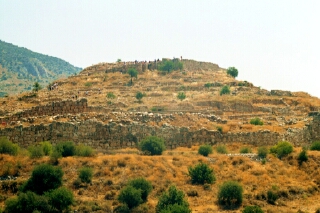
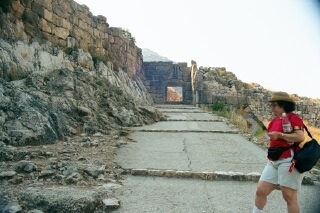
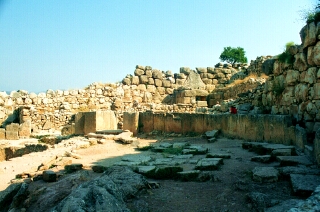
We arrived early enough that I could get clear, people-free pictures of the lion lentil lying atop the main entrance to the walled city. We stepped next to a perfectly shaped round tomb constructed of smaller stones but twenty feet in depth and surrounded above by a double wall of large flat vertical stones which doubtlessly created a corridor in this funerary temple of kings. When Schliemann opened this tomb in the middle of the 19th century and found 14 kilos of gold including a pounded pure gold funerary mask, he cabled the king of Greece to announce that he was staring upon the face of Agamemnon. Subsequent archeologists have dated that portion of the tomb before the probable existence of Agamemnon, who may have been buried across the road in a more impressive beehive domed tomb beyond a stress relieving triangular lentil design, but both tombs are impressive examples of construction on the side of a mountain long before the existence of the First Temple.
We continued up a natural carved marble stairway, which carried us past foundations of homes, public buildings, and narrow streets towards the palace near the top of the mountain. It was from there we could see the throne room and court of Agamemnon looking out over the precipice of the mountain with a shear drop from the place where the window would have been built ten stories to another short outcropping where artisan and tradesmen shops appear just above the final wall with another precipitous drop of hundreds of meters. At one side of the court room, to the right of the impressive window view down the mountain, where I would have placed the throne, are two anterooms, possibly for supplies or courtiers. Across from the window, accessed from an entrance before the entry to the throne room and separated by a wall of particularly large and rectangular stone are the guest rooms. To the left of the window, directly across from the entrance, are placements for two columns at the two sides of an entrance to the private rooms of the king. Just beyond the columns, with the private chambers to the right, lay a circular alter raised from the floor.
One can easily imagine a scene in which a petitioner to the great Agamemnon enters the court. He ascends the mountain to the main gate, passing under a lentil stone with two lions reared to their hind legs and forming an arch beneath their pounce. The gate is monitored by a guard station to your right, so that arrows aimed from there would arrive at your sword side unprotected by the shield held on your left arm. Your admission is permitted, and you pass between some form of metallic gate, for we can still see the hinge holes of the massive doors carved into the stone. You immediately pass a guard house to your right after a smaller guard station tucked in a small room beneath many tons of solid stone, and walk past the funerary tomb in its unnaturally round formation. You ascend many marble stairs enough to make you pant unless you kept your pace to a stroll or were a strong, young warrior, and you pass narrow side streets a human width wide and a maze of dozens of stone buildings containing a civilization, and, in war, an impassible gauntlet of hiding places for men with swords and traps and dead ends accessible to resident archers atop buildings along the way.
You take three major turns as you ascend towards the throne room, and then pass through another gate. Perhaps you are guided to your guest rooms until your audience with the great king can be scheduled, but it is plain that you are not in control of that and cannot blithely walk to the man in the center near the fire wearing the fanciest clothing. You saw soldiers and guards, then town folk, and then the exterior façade of the palace, but, as a traveler from over a millennium and a half before the Christian era, you are certain to be disoriented. The Pyramids are taller, but they are monuments; the Mayans have more and narrower steps arising to a steeper pinnacle, but only one room sits atop and only the priests attend it. This is a government building in a walled city.
You finally arrive at your appointed time to get your first sight of the great ruler. As you approach the entry, you smell the recognizable odor of a sacrificial alter and see the flames on the other side of an enclosed room past two columns and a portal equal in size to the doorway in which you stand. You want to confront the king with your petition, but your eyes are forcibly drawn to the flame hidden within the inner chamber until you glance right towards the throne. Behind the throne is a sheer drop that appears nearly infinite and surely fatal; a fall from here is a fall from grace. Mild acrophobia seizes you as you near the throne to address the king. Though you are the designated speaker for your kingdom and well selected for your rhetorical skills, you cannot help but be awe-struck dumb.
The defenses of the Mycenaean palace are not merely psychological. The mountain is tucked between two windy slopes, and the breeze up the slope on the side of the main gate was enough to take my hat three times, and might have disturbed an attacker's arrow aim. The visibility from the walls onto the light vegetation found on Aegean mountains and plateaus makes a secret approach impossible, even before Galileo's invention of the telescope. Even once inside the easily defended main gate or its five narrow subsidiary gates, all located on the windy side, with a tall, impassible slope and wall on the opposite leeward wall, the streets could be defended through narrow, maze-like paths and dead-ends overhung by blind vantage points for defending archers.
Even a siege would be ineffective, for the Mycenaeans had diverted an underground spring from 500 meters away inside the walls to a cistern carved deep into the marble. With the aid of a laser pen I had brought for the task, so as not to destroy the effect of the descent but provide sufficient illumination for safety, I went with an equally eager Brit who'd left his flashlight in the car. We descended a wide, ample, and easily traversed series of dozens of evenly carved steps twisting through several turns to the bottom of the cistern. At the bottom was a channel carved into rock, which apparently brought the city's water supply. Measured against today's standards, it was an impressive, if overly expensive, public works project. Measured against the Roman aqueducts, it was more elegant as an engineering solution, though it could not carry sufficient water to supply Rome. Measured against Classical Athens, it was better, because the spring that served and defended the much later Acropolis was a natural spring slight diverted into the Erecthianon for a religious explanation of the fight between Poseidon and Athena; once the spring dried, the Greeks abandoned the Acropolis and moved down the hill to the Roman Agora.
I saw, too, the exit Orestes is said to have fled after he killed his mother to avenge her stabbing murder of his father, to be followed by the Furies to Thelfee, where Athena interceded to allow him the trial at which he was acquitted. A bath appears at the palace, said to be the very bath in which Agamemnon met his death at his wife's blade after returning from victory against Troy. It is understandable why Schliemann argues that the Homeric tales are at least based on fact, for this walled city is made to Homer's order, and it was in ruins and believed to have been built by the Cyclopes when Homer wrote.
I enjoyed a lengthy chat with the Brits about the role of appearances and magnificence of power in empire as compared with the exercise of actual power and death in our present reality. I wondered aloud if we were more civilized than those whom we researched. We examined the architecture of the southern gate, with its layered lentil structure predicting the invention of the Roman arch over one thousand years later. We met up again at the Treasury of Atreas, where Agamemnon, if non-mythological, was more likely buried, and I could see in its lentils that they overlapped and bore the weight of their roofs in the posts rather than the walls, removing excess weight with a relieving triangle, and, inside, supporting the concentric rings of the rising dome using overlapping rings creating a beehive appearance, rather than the much later Byzantine concept of a dome transmitting its weight into its walls. But, I could easily see the inadvertent invention of both the arch and the dome by people who stared at the southern gate and the Treasury beehive dome long enough.
As we neared our next destination, we stopped at another supermarket along the way. I had gotten used to stopping at supermarkets as we crossed Greece. First, the tourist traps charge 400-600 drachmas for an undersized can of Coke of 250 ml, significantly less than the 12-oz. cans I find too small at home. There is no equivalent of a 16-oz. size, except in bottled water, and I find bottled water utterly ludicrous in a country with uniformly tolerable tap water. With the extreme need for fluids in the remarkably dry Greek air, I began buying 1.5-liter bottles of Coke, until I soon found that they were pushing a promotional size with an extra 250 ml, exactly as the same products are marketed at home. For 365 to 440 drachmas, even in the tourist traps, I could have a 1.75-liter bottle of Diet Coke, which they call Coca-Cola Light. By stopping in regular supermarkets along the way, I would meet only Greeks, often those who spoke little or no English, and we got by beautifully on symbolic language. As we approached Isthmia, Sheryl joined me in the store, and we bought Greek candies, filled cookies, cherries, watermelon, and native pistachios. The treats were delightful as we moved to the hotel to take our Greek nap.
We moved on towards Isthmia just east of Korinthos and the canal built by the French just before they failed to complete the Panama canal in the 19th century. The canal connects the Korinthian Sea to Athens without circumnavigating the Peloponnese, and I had thought that Isthmia was a modern town created by the canal building. I was wrong. Isthmia was host to one of the four sets of regular games, with others held in Olympia, Delphi, and a fourth place whose name escapes me.
Nevertheless, Sheryl and I were ruined, so to speak, and it was time to find a Greek beach. Time was running short for our visit, and we ruled out the originally considered itinerary to the Greek Islands or Crete, and found a resort in Isthmia, the Kalamaki Beach Hotel. The room rate was unduly expensive, costing over $100 for the night. The food was so bland that it could only be foisted on guests who had pre-paid for a modified American plan. The service was so obnoxious that the concierge could only have the Parisian accent she suffered. The promised sea breeze that would make the absence of air conditioning tolerable never appeared, and I was forced to call at midnight threatening to check out if a fan or other cooling did not arrive promptly. Only then was it possible to locate -- within a minute or two -- a portable air conditioning unit, for which they had the nerve to try to charge extra upon check out. As my final complaint, the hotel was entirely filled with award winning automobile sales leaders, whose obnoxious greeting banners would have suited the most Midwestern American convention center.
But the sea was grand! The blue green was a color I'd never seen, and the clarity allowed visibility to the sand below when swimming in thirty feet of water. The waves were gentle, lapping kisses, with no current or undertow. The pebbles at the water line were tolerable, even for an American spoiled by the sands of the Atlantic or Pacific Oceans, and the water temperature was mild, with bands of cooler and warmer water one could find through experimentation. The saline was high, allowing easy floating -- particularly with the extra fat deposits we'd gained from all that lamb stew -- but there was limited visible plant or animal life. On our first arrival, we were warned off the water's edge by a French family, who kindly pointed out that the shore line was entirely protected by stinging jelly fish, but the Greeks ignored them, and, anyway, the jelly fish were gone by morning. On arrival, we swam in the pool, with its clever design placing the drains on the surface past the edge of the walls so that the water rose all the way to the land surface and glistened naturally across the lawn. Even when we fled the room after they finally installed the air conditioner, while the room cooled, we lazily swam the pool and listened to a Greek performer in the adjacent open air bar, who seemed a bit more authentic in a Turkish art form, but was nevertheless entertaining.
We left Isthmia after a disagreement with the Parisian concierge, insisting that we had not been given a price for the air conditioner before it was installed, and, indeed, had been lied to about the suitability of the room without cooling and the availability of air conditioning. Stassos had taught us that Greek law requires a quoted charge before a tourist service is provided, and the concierge quickly backed down, complaining in a French whine that she'd have to pay it out of her pocket, but, she said pouting, she didn't mind. It was also okay with me, since I didn't like her a bit. Once the dispute was resolved in our favor, she nevertheless bid us a nice day and invited our return, and didn't even sound disingenuous. We loaded the car, took a few more hours of sun and surf in the Aegean, and returned to Athens.
Sheryl had taken over the arrangements, proudly negotiating our rooms, but the best deal back in Athens seemed to be by booking through our Greek travel agency, Dilos, whom we'd found on the Internet. Sheryl booked us into a nicer, business hotel for close to the same price as the Acropolis View. I called Hertz to advise them to recover their car at the Hotel Stanley, only to discover, to my embarrassment, that I'd made it all the way through the trip, emptied and cleaned the car, navigated the Greek streets to a gas station to fill the tank, and, after parking directly across from the hotel, inadvertently locked my keys in the car. I apologized profusely, but it gave me the further opportunity to learn that the Hertz clerk in Ioannina had been lying about the car being native to Athens, and we went blissfully into our final Greek nap with apologies, but little guilt.
We woke around 9:00 p.m., as is slightly late but still customary for the Greeks, and headed back to the Plaka for our last Greek supper and ice cream, to buy gifts for the children and a cheap memorabilia Themis, goddess of justice, for my office desk, and to walk about until it was time to take our taxi to the airport at 3:00 a.m.
The return flight was uneventful, and purely denouement to a wonderful 15th Wedding Anniversary and second honeymoon, and is not worthy of re-telling, except that I have finally found a sufficient level of drugs and alcohol to make me sleep on an international flight. It has been several days since the flight as I complete this travelogue, and I know the hangover will pass soon.
I return ready to go back to my law practice. I actually miss it after ten days away, although I'm a bit jealous of the Greek lawyers who make more money for working six hours a day five days a week. I missed the children to the point an ache as I thought about seeing them while on the long flight home, and I greatly enjoyed their glee as they got their presents.
And, I must say, I missed my custom designed bathroom, with its high water pressure shooting warm water from all directions in my shower and a double Jacuzzi tub atop its own stairs, not to forget my telephone and Internet access in the bathroom. For reasons described above, I have hardly left it for days. But, it now includes a natural Aegean sponge and louffa.